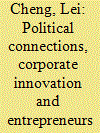| Srl | Item |
| 1 |
ID:
187842


|
|
|
|
|
| Summary/Abstract |
In this paper, we investigate how management team R&D experience affects corporate innovation. A finer-grained empirical analysis supports that firms led by managers with R&D hands-on experience are associated with high innovation productivity. Using the mediation effect models, we uncover three underlying economic mechanisms that possibly explain the relation between R&D experience and innovation; the transformation effect, the information effect, and the resource effect. Furthermore, we find that R&D experience is critical for senior managers (CEO and co-CEO) and junior managers (other executives) in spurring corporate innovation and their combination substantially contributes to increased innovation productivity; however, our findings suggest junior managers play a more fundamental role while senior managers play a leadership role. We also find that managerial R&D experience enhances more innovation in state-owned enterprises (SOEs) than in non-SOEs. Our conclusions are consistent with the learning by doing theory that specialist managers with hands-on experience are more critical for technological innovation.
|
|
|
|
|
|
|
|
|
|
|
|
|
|
|
|
| 2 |
ID:
170101


|
|
|
|
|
| Summary/Abstract |
In this paper, we attempt to reconcile the mixed effects of political connections on corporate innovation. Using the China Employer-Employee Survey (CEES), we find political connections contribute to innovative activities for those firms with innovative entrepreneurs but impedes innovative activities for those without innovative entrepreneurs. After solving the endogeneity problems and correcting the sample selection bias, the baseline results do not change much. Moreover, we find political connections can help firms obtain economic benefits such as tax preference and government subsidies which, however, are utilized by firms to increase fixed asset investment. But such positive effect of political connections on fixed asset investment greatly reduces when the firm's entrepreneur has a strong spirit of innovation. These results provide a reasonable explanation for the change in the direction of the effect of political connections on corporate innovation. This paper succeeds in reconciling the mixed effects of political connections on corporate innovation by taking the entrepreneur's innovative spirit into account.
|
|
|
|
|
|
|
|
|
|
|
|
|
|
|
|